The Asian Journal of Medicine and Health might be one of those journals that will accept anything sent their way, as long as the authors pay the publication fee.
Yesterday, it published an obviously fake study that claimed that hydroxychloroquine could prevent push-scooter accidents – but only in Marseille. The paper has a lot of references to French scientists and politicians, and one of the authors is a famous French dog.
The paper got retracted today, but not before many had a good laugh at it on Twitter.

A predatory journal?
At first glance, the Asian Journal of Medicine and Health might look like a legit scientific journal. It describes itself as follows (caps part of the original text): “aims to publish high quality papers (…) in the areas of Medicine and Health Science. The journal also encourages the submission of useful reports of negative results. This is a quality controlled, OPEN peer reviewed, open access INTERNATIONAL journal.”
However, AJMAH is published by ScienceDomain International, a publisher accused to be “predatory” – i.e. more interested in receiving publication fees than in publishing good-quality science. Predatory journals will accept pretty much anything sent their way, and publish it under the Open Access model, where the authors pay for the publication fees. Typically, their peer review is short or non-existent, and their editorial boards might consist of imaginary scientists or stolen identities.
In its defense, the AJMAH publication price is not that high, $500, and they even have a huge discount, 89%! so the current publication charge is only $55. Compared to other journals, that is a steal.
SDI was firmly included in Beall’s List of predatory publishers and journals. As far as I know their journals are not indexed in Medline and/or PubMed, so most scientists will not read the papers published in SDI journals. But predatory journals can be easily mistaken for legit journals by unexperienced scientists, and can be misused by people who want to publish strange ideas or sloppy science and make it look peer-reviewed.
Sting operations with fake papers and authors
To see if a journal is predatory, groups of scientists have sent obviously-fake papers to a bunch of journals to see which journal would accept it. Here are some hilarious stories about such sting operations, as reported by The Guardian, Vice, Retraction Watch, Neuroskeptic, and Wikipedia.
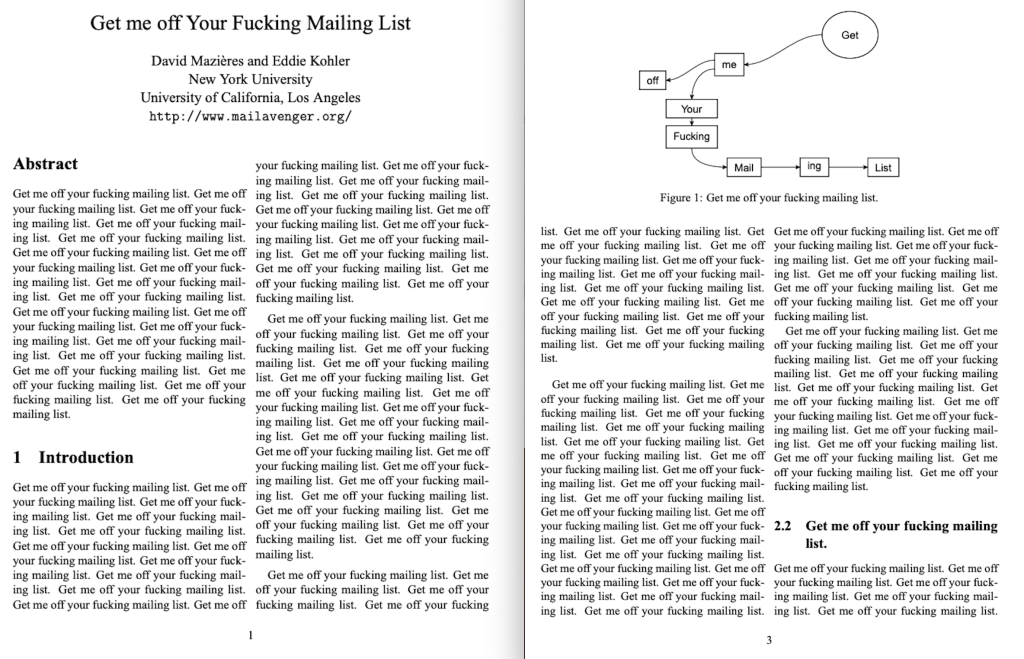
Two top scientific journals also reported about sting operations designed to expose journals as being predatory. As reported in Science, John Bohannon sent over 300 versions of an obviously fake paper to journals suspected to be predatory, and more than half of them accepted the paper without asking any critical questions. In an investigation reported by Katarzyna Pisanski and colleagues in Nature, a fake person working at a fake institution applied to be on the editorial board of several journals. One third of journals marked as ‘predatory’ on Beall’s List accepted – again, no questions asked.
In both of these cases, SDI journals were approached but they did not fall for the scam. The SDI publisher, obviously not happy with being called ‘predatory’, but proud to have recognized the spoof manuscripts and persons, wrote an article on Medium in which they claim that their journals were “confirmed” by both Science and Nature to be not predatory.
Of course, rejecting a fake paper once does not make a predatory publisher legit, the same way that accepting a fake paper once does not make a legit publisher predatory. It just meant that SDI realized they were being fooled. One their 2017 Medium article, which received one clap, they proudly wrote that “From the above discussion, it is imperative to say that ‘Sciencedomain International’ does not follow predatory publication practices.“
But this time, one of the SDI journals, the Asian Journal of Medicine and Health, did accept a fake paper.
The ‘scooters’ paper
The paper, “SARS-CoV-2 was Unexpectedly Deadlier than Push-scooters: Could Hydroxychloroquine be the Unique Solution?“, DOI: 10.9734/AJMAH/2020/v18i930232, by Willard Oodendijk et al. was published after peer review in the Asian Journal of Medicine and Health [archived here and here; pdf here]. The first author name is fake; the actual first author is Mathieu Edouard Rebeaud.

The ‘scooters’ paper is a joke, based on a prediction by Professor Didier Raoult in February 2020, who claimed that scooter accidents caused more deaths in Italy than the new Coronavirus (the YouTube video is Reference 1 in this paper; ‘trottinette’ means ‘scooter’ in English). A prediction that unfortunately turned out to be very, very wrong.
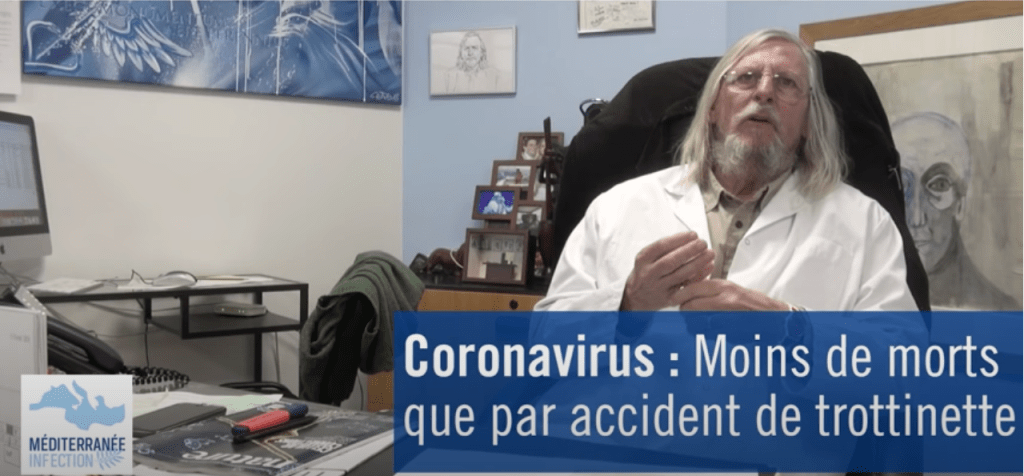
In March 2020, Raoult, director of the IHU Mediterranee Infection in Marseille, France, later published the heavily debated paper by Gautret et al. claiming that hydroxychloroquine miraculously cured 26 COVID-19 patients.
As I wrote in an earlier blog post, the paper had some serious flaws, in particular concerning the lack of randomization and important differences between the control and treatment groups. As an article in Science stated “The popular faith in hydroxychloroquine stands in stark contrast to the weakness of the data.” More critical articles about the work done by Raoult et al. can be found in e.g. The New York Times, For Better Science, and Science.
A presidential dog as a co-author
If you are not familiar with French language, culture, or politics, the author list and their affiliations in the ‘scooters’ paper might need some explaining Luckily, Twitter user @Damien_gnm took the time to clarify some of them.
- Willard Oodendijk works at the Belgian Institute of Technology and Education: the French word ‘bite’ means ‘dick’
- Didier Lembrouille shares his first name with Didier Raoult. L’embrouille means ‘confusion’. SFR is an internet access company.
- Otter F. Hantom has a name that sounds very similar to “auteur fantôme’, a ghost author. He works at the University of Melon – saying that someone has a ‘big melon’ means that someone is full of themselves.
- Nemo Macron (affilation: Palais te l’Elysée, Paris, France) is the name of the dog of the French President.
- The last author, Manis Javanica, happens to share their name with a pangolin species in Southeast Asia, the animal that was initially a suspect for coronavirus transmission.
- Several people thanked in the Acknowledgements are politicians without scientific background who defended Didier Raoult.
- The French professor himself is thanked as well. The Acknowledgements end with: “Obviously, Didier Raoult, with or without whom we would be nothing.”
You can read more about how and why the ‘scooters’ paper was created, and how the manuscript was handled by the journal on Mimiryudo (in French).
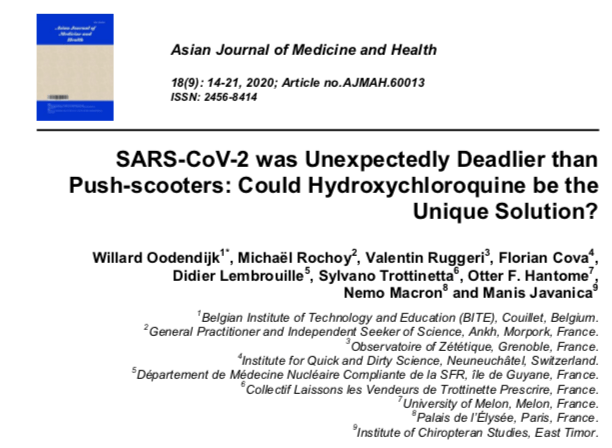
But even if you would not immediately grasp that most author names or their affiliations are meant to be funny, the Authors’ Contributions should make it very clear that this whole paper was a joke.
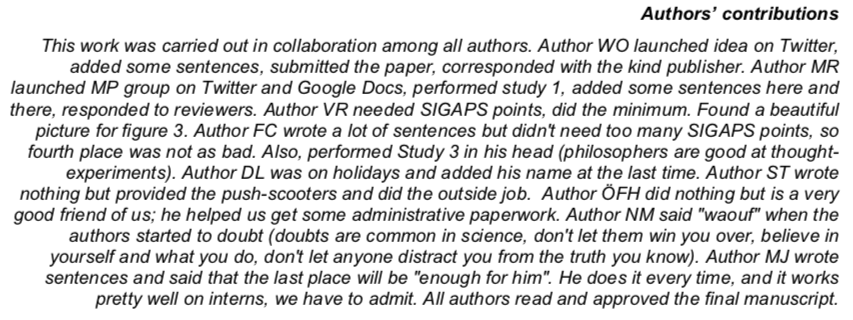
‘We swear the assignment to either condition was random’
The study – jokingly – claimed that ‘push-scooter related accidents’ (PSA) were zero in March 2020, and thus ‘hydroxychloroquine was an effective preventive therapy for PSA with a RR = 0 (p<0.0001).’

Study 2 was excluded from the paper because ‘it did not provide informative results (i.e. the results we wanted).’
Study 3 had some interesting parallels to the Gautret et al. study. The authors swear that the assignment of friends and relatives to the control and treatment groups was completely random.
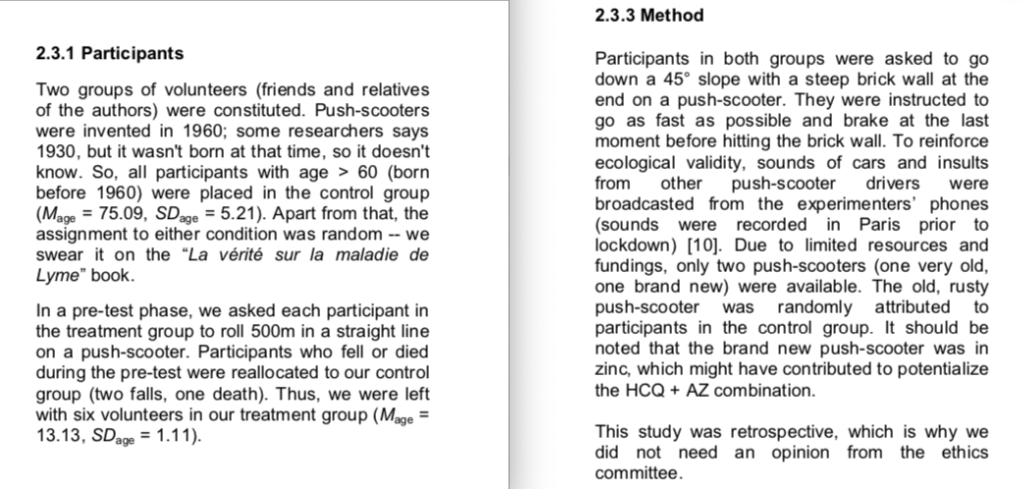
Not surprisingly, the conclusion of the paper is that hydroxychloroquine treatment was associated with lower odds of push-scooters accidents.

Retraction and peer reviewers’ reports
The paper was retracted within 24h of its online publication, after the real people behind the paper revealed on Twitter that their fake paper had been accepted in AJMAH.
The journal wrote: “This article was retracted after reporting of serious scientific fraud.”
Of interest, the peer reviewers’ comments [archived] became available online only after the paper got retracted.
Peer 1 brought up some good concerns [pdf]. He pointed out that the Methods should contain more details so that the papers would be reproducible, and that the sample size was a bit low. Also, the font size should be smaller. His list of comments was pretty long, but nowhere does he give the impression that he recognized the paper was fake.
Peer 2 did not find it very scientific to say that the study took place in a office chair “where we sit every day to do part of our work” [pdf]. She also brought up the very valid point that the decrease of scooter accidents might not only be related to hydroxychloroquine use, but also because of the decrease in scooter circulation. This excellent point was then later added to the paper – after which she was apparently happy enough to accept the paper.
Peer 3 was very brief [pdf]. He just thought that Hydroxychloroquine would not really prevent infection with the coronavirus. He did not appeared to have read the paper at all.
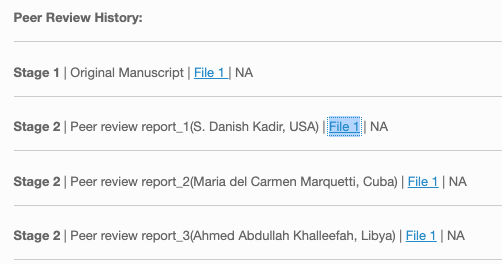
Despite the relatively mild comments by the three reviewers, both Editors 1 and 2 thought this paper should be rejected. Editor 1 did not find the manuscript good enough to publish, and, in a later letter pointed out that it was wrong that the authors were in the Ethics committee, with some friends. Editor 2 used stronger words: “Please reject the manuscript! It does not meet the minimum standards of a scientific paper.” Kudos to Editor 2, who alas was promptly removed from the process. Editor 1 was quickly persuaded to accept the paper. To replace the overly critical Editor 2, Editor 3 was brought on board, who did not have any objection to publish the study.

A joke? Or science misconduct?
As written by the journal “This article was retracted after reporting of serious scientific fraud.” – which is technically true. A fake paper is fabricated research, which falls under the definition of misconduct. So should the authors of such spoof papers, who write those with the intention to expose flaws in the peer-review process of predatory journals be accused of misconduct themselves? There have been many discussions about that, such as in the case of the Sokal Hoax, where the author of the fake paper was accused of deceit.
But one could also argue that if the paper is a clear joke (such as the Get me off your f*ing mailing list paper mentioned above), peer reviewers and editors should have been more vigilant. In that view, the end justifies the means, because such papers expose a dark side of scientific publishing.
With this paper, because of the many French references that might not be clear to others, it might not have been immediately obvious that the paper was a joke. For example, I was not familiar with the Didier Raoult quote about scooters and COVID-19 mortality, so that joke was initially lost on me. But the contribution section and many parts of the papers were clearly fake, in my opinion. Still, I would love to hear other opinions about the paper. Did you have a good laugh about it? Was it a brilliant joke – or did this go too far?


Nice analysis.
The article can still be read here :
http://www.mimiryudo.com/blog/wp-content/uploads/2020/08/Article.pdf
More on the background here (in French) by one of the authors :
http://www.mimiryudo.com/blog/2020/08/le-meilleur-article-de-tous-les-temps/
And by me :
(start with h.. p://) seppi.over-blog.com/2020/08/hydroxychloroquine-un-enorme-canular-scientifique-publie-dans-une-revue-predatrice-avant-de-lire-soulagez-votre-vessie-par-precautio
The spoof is a reply to an (alledgedly scientific) article by a bunch of physicians (many with a specialty outside the scope of the Covid issue – such as psychiatry in the case of Member of Parliament Martine Wonner) and a researcher whose instituion of affiliation has repudiated the work and rejected both the methodology and the conclusions. That article is here :
(start with h..ps://) journalajmah.com/index.php/AJMAH/article/view/30224/56706
Among the acknowledgements, there is a very serious one :
« Hervé de Maisonneuve for his fight against predatory magazines and his daily struggle for good French science. That’s probably the only serious sentence in all this (not counting this one, we don’t want to risk a paradox). »
There is also worth of notice :
« Joachim Son-Forget, Member of Parliament, who taught us that linear regression starts from 3 points; we soon hope to push the limits and reach the purity of linear regression at 1 point. »
I have seen that « hilarious » linear regression based on three points.
To say the least colloquially, he’s pissed off as demonstrated by his Twitter account. He is a neurosciences specialist at the University Hospital of Lausanne.
Much of the pun may escape non-francophone readers and, let’s be fair, escaped the editors and reviewers.
For instance, the name Sylvano Trotinetta is derived from « trottinette », a push-scooter. The character is affiliated with « Collectif Laissons les Vendeurs de Trottinette Prescrire, France » (collective « let push-scooter vendors prescribe »). This echoes the affiliation of the medics of the previous « study », « Collectif Laissons les Médecins Prescrire » (collective « let the practioners prescribe), a lobbying operation to push the Minister for Health to lift his ban of HCQ prescriptions by city practitioners.
Neuneuchatel for author Florian Cova (his real name) stands for Neuchâtel, Switzerland. « Neuneu » is colloquial for gaga.
Etc.
The article has been retracted… The one which caused the spoof and which the editor should know by now that it is seriously flawed still stands… Predators they are, predators they remain.
LikeLike
You’ve seen linear regression with three points?
I have seen, published and all, linear regression on two points! Sadly it is included in my extremely long laundry list (my official list is >350, but I stopped collecting them in 2011-2012, so we’re likely well over 1000 now) of fundamentally flawed papers, so it would take me forever to find it again.
LikeLike
Were you able to verify the existence of the “reviewers”? A quick search online did not give results for me.
LikeLike
The first two reviewers are easy to find with a google search and appear to be real people (no opinion here on whether they actually reviewed the paper: one might ask them). I can’t find the Libyan reviewer but transliteration of names from Arabic produces a lot of spelling ambiguities.
LikeLike
Reviewer 2 at least seems to be a real person: https://www.researchgate.net/profile/Maria_Del_Carmen_Marquetti
LikeLike
Predatory journalism is a bane to scientific advancement. More sting operations of this nature are needed to further expose these deplorable publishers. Those behind these journals are nothing but criminals!
‘Science Domain’ is very notorious in this regard. Unaware of who they are, I once review for some of their journals before realizing it is just a waste of precious time. Most times, they went ahead to publish manuscripts despite strong advice by peer reviewers against such publication.
I urge genuine editors and reviewers to withdraw their services from these kind of publishers. Authors should also stop publishing their works with them. They are nothing but fraudsters masquerading as publishers.
LikeLike
I found the article hilarious and I had a good laugh reading it. There are several interesting sentences, which as you mentioned relate to French culture. Still, they mean something in the general context of nowadays science, like the last sentence “As the great French scientist Jean-Claude Dusse once said: “You never know, on a misunderstanding it might work.”” Jean-Claude Dusse is not a scientist but the character of one of the most popular French movies (French Fried Vacation). He constantly tries to score girls and fails all the time. But for one of his friends who never witnesses the failures, he is apparently good at it. One day Dusse again pretends he has a date and this friend tells him how much he admires his talent. Dusse then gives him the advice that since both of them have the same problem with not being handsome men, he should like him forget he has no chance and go for it, because “You never know, on a misunderstanding it might work.” It sounds pretty much like a motto for scientific publishing nowadays. Forget that your data is incomplete, crap or even fake, send it for publication anyways, “You never know, on a misunderstanding it might work.”
The other sentence I want to comment is also in the conclusion: “I think that the question, it is quickly answered”. It relates to a video, which went viral and has been more than widely ridiculed, commented and charicatured. Although it is in French you’ll see what it is about from https://www.youtube.com/watch?v=8VSFjyF3B5E
A young Swiss fellow presents a get-rich-quick scheme, basically a scam. At some point he asks the viewer if they are ready to do what it takes to get rich and own a luxury car like his. Then he says “I think that the question, it is quickly answered.” In the French version (“je crois que la question, elle est vite répondue”), there is a grammar mistake that turns the sentence completely ridiculous. Then the viewer is left to watch a self-important guy who thinks he can lecture the world, but is not even able to speak proper French. Now, do you think that in academia, it is possible to find self-important j*rks who lecture the world with their doubtful or even fake studies? “I think that the question, it is quickly answered.”
PS: to eliesbik, I am a great admirer of your work.
LikeLike
Alas, you and/or @Damien_gnm seem to have missed one: If ‘Willard Oodendijk’ were printed with a first initial, as is commonly done, it would look like ‘wooden dick’.
LikeLike